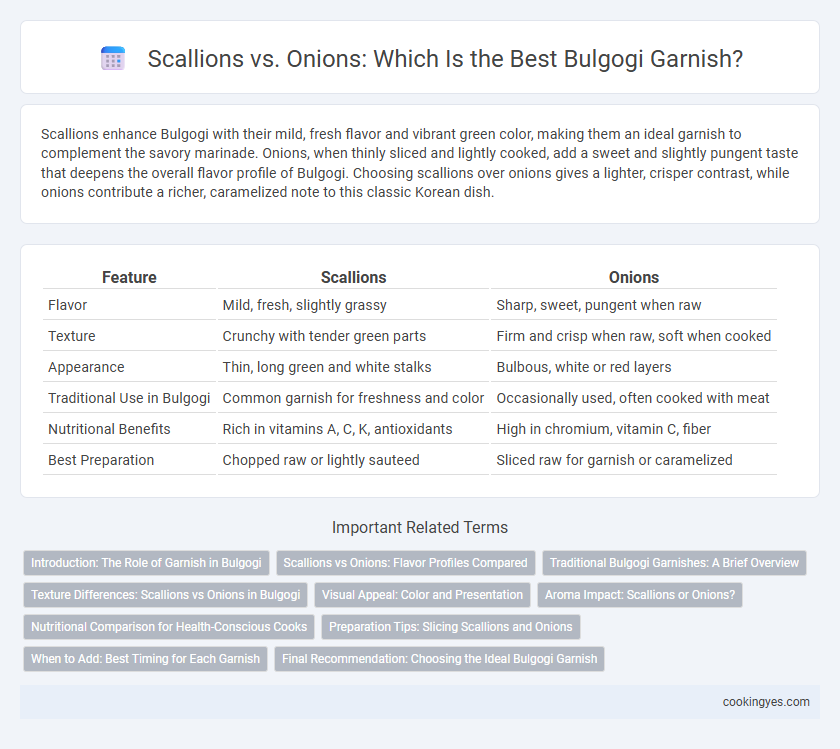Scallions enhance Bulgogi with their mild, fresh flavor and vibrant green color, making them an ideal garnish to complement the savory marinade. Onions, when thinly sliced and lightly cooked, add a sweet and slightly pungent taste that deepens the overall flavor profile of Bulgogi. Choosing scallions over onions gives a lighter, crisper contrast, while onions contribute a richer, caramelized note to this classic Korean dish.
Table of Comparison
| Feature | Scallions | Onions |
|---|---|---|
| Flavor | Mild, fresh, slightly grassy | Sharp, sweet, pungent when raw |
| Texture | Crunchy with tender green parts | Firm and crisp when raw, soft when cooked |
| Appearance | Thin, long green and white stalks | Bulbous, white or red layers |
| Traditional Use in Bulgogi | Common garnish for freshness and color | Occasionally used, often cooked with meat |
| Nutritional Benefits | Rich in vitamins A, C, K, antioxidants | High in chromium, vitamin C, fiber |
| Best Preparation | Chopped raw or lightly sauteed | Sliced raw for garnish or caramelized |
Introduction: The Role of Garnish in Bulgogi
Scallions and onions serve distinct roles as garnishes in bulgogi, enhancing its flavor and presentation. Scallions contribute a fresh, mild onion flavor with a crisp texture that complements the savory marinade. Onions add sweetness and a slight crunch, balancing the richness of the grilled beef while providing a vibrant visual contrast.
Scallions vs Onions: Flavor Profiles Compared
Scallions offer a mild, fresh onion flavor with subtle sweetness that enhances Bulgogi without overpowering the dish. Onions provide a stronger, more pungent taste with a natural caramelized sweetness when cooked, adding depth and richness to the marinade. Choosing scallions emphasizes brightness and freshness, while onions contribute boldness and complexity to Bulgogi's overall flavor profile.
Traditional Bulgogi Garnishes: A Brief Overview
Traditional Bulgogi garnishes often feature scallions for their mild, fresh flavor that complements the sweet and savory marinated beef. Onions are used in the marinade to add depth but are less common as a garnish due to their stronger bite. Scallions provide a subtle crunch and vibrant color, enhancing the dish's presentation and taste authenticity.
Texture Differences: Scallions vs Onions in Bulgogi
Scallions provide a crisp, light crunch that enhances the tender, marinated beef in bulgogi, adding a fresh, mild onion flavor without overpowering the dish. Onions offer a denser, juicier texture with a sharper taste, which can complement the sweetness of the soy-based marinade but may soften more during cooking. Choosing scallions over onions preserves textural contrast and brightness in bulgogi garnish, balancing the rich, savory flavors with a delicate snap.
Visual Appeal: Color and Presentation
Scallions offer a vibrant green color that enhances the visual appeal of Bulgogi, creating a fresh and lively presentation. Onions, with their translucent white layers, provide a subtle contrast that highlights the rich, caramelized beef. Using scallions emphasizes brightness and freshness, while onions contribute a classic, understated elegance to the dish's overall look.
Aroma Impact: Scallions or Onions?
Scallions provide a fresh, mild onion aroma that enhances the sweet and savory flavors of Bulgogi without overpowering the dish. Onions offer a stronger, more pungent aroma that intensifies the meat's umami profile but can sometimes mask subtler marinade notes. Choosing scallions preserves a delicate balance in Bulgogi's flavor bouquet, while onions create a bolder aromatic contrast.
Nutritional Comparison for Health-Conscious Cooks
Scallions provide a higher concentration of vitamins A and K compared to onions, making them beneficial for immune support and bone health in Bulgogi dishes. Onions offer more quercetin, a powerful antioxidant linked to heart health and inflammation reduction, which can enhance the nutritional profile of Bulgogi. Health-conscious cooks should consider scallions for added micronutrients and onions for antioxidant properties when selecting garnishes.
Preparation Tips: Slicing Scallions and Onions
Thinly slice scallions diagonally to enhance their mild, fresh flavor and provide a delicate crunch that complements the tender, marinated beef in bulgogi. For onions, cut them into thin rings or half-moons to balance their sharpness with the sweet and savory glaze of the dish. Ensuring uniform thickness in both scallions and onions promotes even cooking and a harmonious garnish texture.
When to Add: Best Timing for Each Garnish
Scallions for Bulgogi garnish are best added at the very end of cooking or just before serving to preserve their fresh, crisp texture and sharp flavor. Onions can be cooked with the meat from the beginning or added midway, allowing them to soften and caramelize, enhancing the sweet and savory profile of the dish. Timing the addition of scallions and onions correctly maximizes their individual flavor contributions and complements the marinated beef perfectly.
Final Recommendation: Choosing the Ideal Bulgogi Garnish
Scallions offer a vibrant, fresh flavor and crisp texture that complements Bulgogi's savory marinade, enhancing its overall taste without overpowering. Onions provide a sweeter, mellow profile, especially when lightly cooked or pickled, which balances the richness of the beef. For an ideal Bulgogi garnish, scallions are recommended for their brightness and textural contrast, while onions suit those preferring a subtler, sweet undertone.
Scallions vs Onions for Bulgogi Garnish Infographic

 cookingyes.com
cookingyes.com